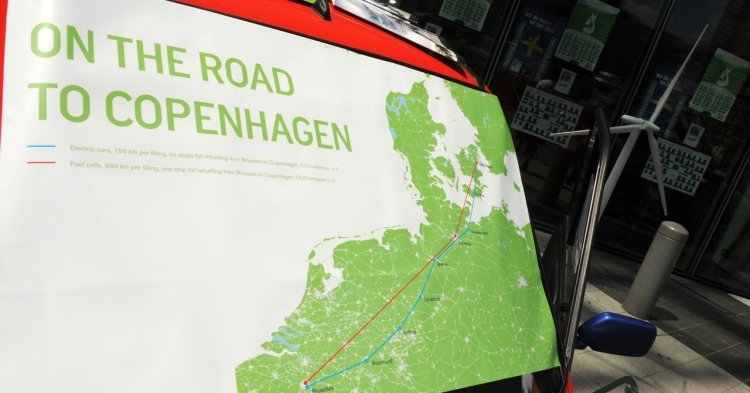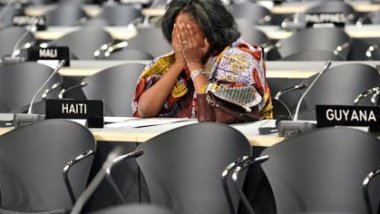The wasted big chance
The United Nations Climate Change Conference held in Copenhagen last December was presented as the most important climate Summit of the decade, it was called to replace the famous Kyoto Protocol. Indeed, it was a very important opportunity for the EU to demonstrate its capability to lead the change needed to stop global warming. The EU directed the preparation talks for the Copenhagen Conference, and it even proposed a 30% emissions decrease by 2020 if joint by the rest of the developed world. Still, the meeting ended up with a short and disappointing document made up between the US and the emerging economies which the EU merely accepted.
The European Parliament delegation to the conference admitted in a declaration that the high expectations and well-meaning ambitions of the EU had been left without response. The goal was to arrange a legally binding agreement which would build up, among other policies, a system of international monitoring of emissions, in where the states could mutually inspect their outcomes. Instead, the final text establishes a system of international consultations in where every country will communicate their level of emissions to the UN with full respect to their sovereignty. This is a sad victory of those countries that still see environmental policies as a dispensable enemy to their growth.
The new European strategy
Now the EU has to find a way to restore its capacity and influence to lead the fight against climate change. This is nowadays a field in where the EU has to hold the leadership for its own right and the moral authority that arises from being the only region so far to have established concrete goals of emissions decreasing and mechanisms to implement them.
Now the EU has to find a way to restore its capacity and influence to lead the fight against climate change. This is nowadays a field in where the EU has to hold the leadership for its own right and the moral authority that arises from being the only region so far to have established concrete goals of emissions decreasing and mechanisms to implement them. In order to do so before the next conference in Cancun at the end of this year, the commission published this March a communication to the other institutions titled “International climate policy post-Copenhagen: Acting now to reinvigorate global action on climate change”.
This document comes up with several important initiatives, such as the creation of an international market of emissions similar to the one functioning in the EU. The results must first be seen at home. Whatever the outcome in Denmark, the first that the EU is going to do is carry on with the project launched a couple of years ago; the Climate and Energy Package, which establishes a reduction of 20% of the emissions by 2020 together with the same amount of increasing increment in renewable resources and efficiency improvement.
These are remarkable goals compared with what any other region has proposed so far. They will work both as an example to the world and as a way to build a more energetically independent Europe. Most of the member states are energetically dependent; either of Russia in central Europe or of Algeria and other countries in the southern states. This should gradually stop being a weak point for the EU as a global actor, and since our resources are not as abundant, the best solution is to implement the first steps to transform the industry into the exploitation of green energy.
The failed sovereignty
These policies might carry things out at home, but they will not have it easy to change the strategies of the main polluters of the world. One of the issues in which the EU has to play a biggest role is in the negotiation with developing countries. The communication of the commission also includes and explores the way to resolve the difficult debate about the financial help that the so-called G77 members demand to implement any actions. In its recently published communication, the commission declares its willingness to initiate a fast-start funding commitment, together with the Economic and Financial Affairs Council and, internationally, with the other developed nations.
Furthermore, the EU is resolved to lead the creation of a market of emissions more robust and inclusive than the proposed in the Kyoto Protocol. This would be divided up in various steps. By 2015 an OECD-wide market should be functioning, and before the end of this decade the goal is to expand it to other developed countries like Japan or Australia. The successful functioning of the European Union Emission Trading System since 2005 is another case of the advantages of shared sovereignty, contrarily; the failure in setting up a concrete form of trustworthy inspections in the final Copenhagen Accord exposes the severe limitations of impenetrable sovereignty to solve global problems.
The climate will be if Europe is
The solution is easier to say than to do, but at the international level, it would mean to have a more effective system of negotiations in the UN and a fully enforceable international environmental law.
The solution is easier to say than to do, but at the international level, it would mean to have a more effective system of negotiations in the UN and a fully enforceable international environmental law. The power equilibrium however, with the emerging economies and the lack of political willingness take most of the goals that Europe fights for out of the scope of many countries. The role of the EU in this decade can be crucial for the future of the climate change, but it depends on its ability to make tools for international pressure out of these initiatives. Just as in any other field, if the Union does not translate its economical weight and soft power into leadership in the international arena, there won’t be much hope left for the climate.




Follow the comments: |
|
